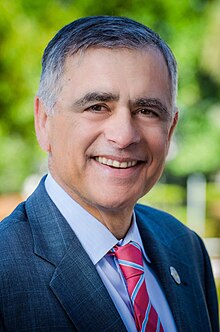Sheldon Schuster
Sheldon Mark Schuster | |
|---|---|
 Schuster in 2015 | |
| 2nd President of Keck Graduate Institute | |
| Assumed office July 15, 2003 | |
| Preceded by | Henry E. Riggs |
| Personal details | |
| Born | 1947 San Mateo, California, U.S. |
| Alma mater | |
| Scientific career | |
| Fields | Biochemistry and molecular biology |
| Institutions | |
| Thesis | The Regulation of the Pyruvate Dehydrogenase Multienzyme Complex by Calcium and Magnesium in Heart Mitochondrial Systems (1974) |
| Doctoral advisor | Merle S. Olson |
Sheldon M. Schuster (born 1947) is an American biochemist, cancer researcher and academic. He served as president of Keck Graduate Institute from 2003–2024. He previously served as a professor at University of Nebraska–Lincoln and University of Florida. While at Florida, he was the director of research and the university's biotechnology program.
Early life
[edit]Schuster was born in 1947 in San Francisco Bay Area, California where he was also raised.[1][2]
He attended University of California, Davis, graduating with a bachelor's degree in biochemistry.[2] He went on to attend a doctorate program at University of Arizona, graduating in 1974 with a PhD in biochemistry; after which, he conducted postdoctoral research at the University of Wisconsin Institute for Enzyme Research.[3]
Career
[edit]In 1976, Schuster began teaching chemistry and biology at the University of Nebraska–Lincoln.[4][3] He continued teaching at the university until 1988, when he left to join the faculty of University of Florida.[4]
Schuster became a professor of biochemistry and molecular biology at University of Florida in 1989.[3] In 1992, he went on to become the director of the biotechnology program and also served as the assistant VP of research at the University of Florida (UF).[4][3]
In 2000, while working at the UF Brain Institute, Weihong Tan, Schuster, Jeffery Li and Xiaohong Fang published a study on a synthetic DNA that acts like a photophore. The molecule, which illuminates when exposed to particular other molecules, can potentially be used to detect specific proteins or genes, which could allow for the detection of certain diseases.[5]
On July 15, 2003, Schuster became the second president of Keck Graduate Institute (KGI), taking over for the founding president of the institute, Henry E. Riggs.[2] According to the National Research Council, Schuster helped expand KGI's Professional Science Master's Degree program "to include new centers focused on bioprocessing, rare diseases, and biomarkers."[3] Schuster served as president at KGI for 21 years and retired in 2024.[6]
He is currently one of the editors of the Biochemistry and Molecular Biology Education journal and a fellow of the American Association for the Advancement of Science. He has co-founded two pharmaceutical companies, AquaGene and Restoragen (previously known as BioNebraska).[3] Schuster also serves as the vice chairman for the National Organization for Rare Disorders.[7]
Published work
[edit]- Schuster, Sheldon M. (1974). The Regulation of the Pyruvate Dehydrogenase Multienzyme Complex by Calcium and Magnesium in Heart Mitochondrial Systems (Ph.D. thesis). University of Arizona. hdl:10150/288235. OCLC 1118678641. ProQuest 302736512.
- Schuster, Sheldon M.; Olson, Merle S. (1974-11-25). "Studies of the Energy-dependent Uptake of Divalent Metal Ions by Beef Heart Mitochondria". Journal of Biological Chemistry. 249 (22): 7151–7158. doi:10.1016/S0021-9258(19)42086-3. PMID 4474172.
- Schuster, S. M.; Ebel, R. E.; Lardy, H. A. (1975-10-10). "Kinetic studies on rat liver and beef heart mitochondrial ATPase. Evidence for nucleotide binding at separate regulatory and catalytic sites". Journal of Biological Chemistry. 250 (19): 7848–7853. doi:10.1016/S0021-9258(19)40893-4. PMID 126241.
- Arpaia, E.; Dumbrille-Ross, A.; Maler, T.; Neote, K.; Tropak, M.; Troxel, C.; Schuster, S. M.; Clarke, J. T. R.; Gravel, R. A. (1988-05-05). "Identification of an altered splice site in Ashkenazi Tay–Sachs disease". Nature. 333 (6168): 85–86. Bibcode:1988Natur.333...85A. doi:10.1038/333085a0. PMID 3362213. S2CID 4273187.
- Chakrabarti, R.; Wylie, D. E.; Schuster, S. M. (1989-09-15). "Transfer of monoclonal antibodies into mammalian cells by electroporation". Journal of Biological Chemistry. 264 (26): 15494–15500. doi:10.1016/S0021-9258(19)84857-3. PMID 2768274.
- Fang, Xiaohong; Liu, Xiaojing; Schuster, Sheldon; Tan, Weihong (1999-03-01). "Designing a Novel Molecular Beacon for Surface-Immobilized DNA Hybridization Studies". Journal of the American Chemical Society. 121 (12): 2921–2922. doi:10.1021/ja9837809. S2CID 95972270.
- Li, Jianwei Jeffery; Fang, Xiaohong; Schuster, Sheldon M.; Tan, Weihong (2000-03-17). "Molecular Beacons: A Novel Approach to Detect Protein – DNA Interactions". Angewandte Chemie. 112 (6): 1091–1094. doi:10.1002/(sici)1521-3757(20000317)112:6<1091::aid-ange1091>3.0.co;2-t.
- Ando, Miki; Sugimoto, Koichi; Kitoh, Toshiyuki; Sasaki, Makoto; Mukai, Kouichi; Ando, Jun; Egashira, Motoki; Schuster, Sheldon M.; Oshimi, Kazuo (2005-09-01). "Selective apoptosis of natural killer-cell tumours by l-asparaginase". British Journal of Haematology. 130 (6): 860–868. doi:10.1111/j.1365-2141.2005.05694.x. PMID 16156856. S2CID 9164321.
References
[edit]- ^ Schuster (1974), p. 2
- ^ a b c Hong (2003)
- ^ a b c d e f National Research Council et al. (2012)
- ^ a b c Lincoln Journal Star (2001)
- ^ Hagy (1990)
- ^ "KGI welcomes new president". Claremont Courier. July 4, 2024. Retrieved October 28, 2024.
- ^ "NORD Appoints Genetics and Metabolic Specialist Marshall L. Summar M.D. as Chairman of the Board". National Organization for Rare Disorders. June 15, 2016. Retrieved 2018-04-11.
Sources
[edit]- "Cancer Researchers Say Cigarette Taxes Needed". Trend Magazine. 1984-01-24. p. 1. ProQuest 401215294.
- Hagy, J. R. (1990). "Catching a Glimpse of the Future". Florida Trend Magazine. Vol. 32, no. 13. p. 11. ProQuest 212298002.
- "Three set to interview for UNL vice chancellor position". Lincoln Journal Star. 2001-01-31. p. B5. ProQuest 247999932.
- Hong, Peter Y. (2003-06-12). "Scientist Named Keck Graduate Institute President". Los Angeles Times. Retrieved 2017-04-17.
- National Research Council; et al. (2012-09-14). From Science to Business: Preparing Female Scientists and Engineers for Successful Transitions into Entrepreneurship: Summary of a Workshop (PDF). National Academies Press. p. 47. ISBN 9780309256094.
{{cite book}}:|last2=has generic name (help)CS1 maint: multiple names: authors list (link)
